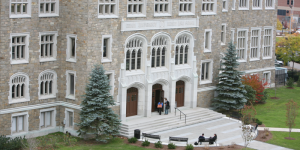I am looking for advice on the offer I should accept. My area of interest is comparative constitutional law/comparative criminal procedure. Harvard's con law faculty is amazing, but I have heard the Harvard LL.M program described as something of a "fourth year of law school", whereas Oxford's BCL program is said to be geared towards graduate students with more intensive courses and one-on-one instruction. Thanks for any advice you can provide.
Harvard LLM vs. Oxford BCL
Posted Apr 02, 2007 21:08
Posted Apr 02, 2007 21:18
Tricky. I was in a similar position a couple of years back. Although I don't have first-hand experience of either programme I have lots of friends who have gone through both and I did a US LLM. Personally I think the BCL is a superior program because it is an actual graduate degree with intensive tutorials that challenge your thinking. Also, Oxford jurisprudence faculty is unmatched in the world.
That being said, I decided to study in the US because its legal system was so different from my own and I thought of Oxford as being too conservative and "black letter" for me at the time.
While I enjoyed my LLM this was largely for the experience living in NYC as opposed to the particular courses (which were good but probably not a patch on Oxford's graduate classes) I didn't like being lumped in with the JDs. At the risk of causing offensive to some who may be reading here I found many immature intellectually (although some had PhDs in other subjects many were only second year JDs whose thinking hadn't developed in a theoretical or critical way regarding law) and the people who really challenged my thinking were the other LLM students. The JDs seemed more keen to get good grades and get law firms jobs than engage in original thinking. All generalizations, I know, but those are my thoughts.
That being said, I decided to study in the US because its legal system was so different from my own and I thought of Oxford as being too conservative and "black letter" for me at the time.
While I enjoyed my LLM this was largely for the experience living in NYC as opposed to the particular courses (which were good but probably not a patch on Oxford's graduate classes) I didn't like being lumped in with the JDs. At the risk of causing offensive to some who may be reading here I found many immature intellectually (although some had PhDs in other subjects many were only second year JDs whose thinking hadn't developed in a theoretical or critical way regarding law) and the people who really challenged my thinking were the other LLM students. The JDs seemed more keen to get good grades and get law firms jobs than engage in original thinking. All generalizations, I know, but those are my thoughts.
Posted Apr 02, 2007 21:24
Very nice comments flygirl. They are insightive for those applying for next year LLM. I think many people who have done LLM in UK always say that it is vey intellectually stimulating because graduate students have separate classes +lecturers all have PHD in law which I understand is not the case in US. I dont know whether this is important to you, it can affect your decision
Posted Apr 02, 2007 21:36
Glad I can be helpful.
I am not sure that the professors in the UK are better than the US professors. My professors at Columbia were outstanding (and many had UK doctorates) but there is a different way of talking about the law in the US. US professors, I think, on the whole tend to think more creatively about the law using other disciplines (such as literature, sociology etc) to inform their legal discussions. The UK is more conservative ("the law of X" as opposed to "the law and X"). Traditionally one hasn't needed a PhD in law to be an academic (unlike other disciplines) and I am not sure having one indicates you are more knowledgeable about your area. I do think having a PhD, however, means you are more likely to be theoretical.
My comments were more about the quality of students - I imagine a BCL class would be at a higher level since all the students are graduates.
I am not sure that the professors in the UK are better than the US professors. My professors at Columbia were outstanding (and many had UK doctorates) but there is a different way of talking about the law in the US. US professors, I think, on the whole tend to think more creatively about the law using other disciplines (such as literature, sociology etc) to inform their legal discussions. The UK is more conservative ("the law of X" as opposed to "the law and X"). Traditionally one hasn't needed a PhD in law to be an academic (unlike other disciplines) and I am not sure having one indicates you are more knowledgeable about your area. I do think having a PhD, however, means you are more likely to be theoretical.
My comments were more about the quality of students - I imagine a BCL class would be at a higher level since all the students are graduates.
Posted Apr 02, 2007 21:48
On the practical side, one thing I should point out is the resources are probably 10 times better at Harvard since it is a much wealthier, private institution than Oxford. This can make a huge difference on the day to day level (eg: wireless internet connection in your room etc etc). That being said, the individual colleges at Oxford can be extremely wealthy so it may not make a difference.
Posted Apr 22, 2007 14:49
flygirl, do the same comments apply to an Oxford MJur? (because I've heard they sometimes treat the BCL differently from the MJur)
Posted Apr 25, 2007 04:40
Jumping in here--the MJurs attend exactly the same classes and do exactly the same work (with some very minor modifications to account for the fact that not all of the MJurs are working in their first language) as the BCL candidates, so I would think flygirl's comments apply equally to them.
If you want a rigorous year, and would like to have your limits stretched, I say go for the BCL. I've heard good things about a comparative public law course that McCrudden runs for the BCL/MJur students--it doesn't run every year though, so try to e-mail the Law Faculty to check if that might be a consideration in your decision-making.
One thing you might want to consider, if you're not American and intend to teach public/constitutional law in your home country, is that--as flygirl says--you would be doing courses with the JDs at Harvard. That means studying American constitutional law which, while fascinating in all its complexity, is somewhat idiosyncratic.
If you want a rigorous year, and would like to have your limits stretched, I say go for the BCL. I've heard good things about a comparative public law course that McCrudden runs for the BCL/MJur students--it doesn't run every year though, so try to e-mail the Law Faculty to check if that might be a consideration in your decision-making.
One thing you might want to consider, if you're not American and intend to teach public/constitutional law in your home country, is that--as flygirl says--you would be doing courses with the JDs at Harvard. That means studying American constitutional law which, while fascinating in all its complexity, is somewhat idiosyncratic.
Posted Jan 09, 2012 17:30
I did both the Harvard LLM and the Oxford BCL. There is no comparison; the Oxford BCL is a much more demanding course. Oxford as a much larger Law Faculty than Harvard, uses the world's best philosophers for some of the courses, and has many professors who hold chairs for half the year in Oxford and the other half of the year in the US, such as Professor Jeremy Waldron of NYU. There is no one at Harvard like John Finnis, John Gardner, or Joseph Raz. Oxford is much more academic--and it is for this reason it is a very demanding course to excel in. I was top of my class in Harvard, but was out ranked by at least 12 students in the BCL. As for the fame of the three schools, Oxford and Cambridge are every bit as famous has Harvard. Oxford is more famous, thanks to its publishing, dictionaries, etc. A homeless person anywhere has heard of Oxford, including those in the remotes parts of China and Africa. Cambridge University is equally famous as Harvard; it is silly to think any employer who has heard of Harvard has not heard of Cambridge. John Harvard was a student at Cambridge University before he went to the USA to set up Harvard University. Cambridge also has an exchange program with Harvard--Harvard JD's can do the last year of their JD as an LLM at Cambridge. I have heard that the Cambridge LLM is very demanding, but is not as difficult to gain entry to as the BCL. I must also note, that many US Supreme Court judges have done the Oxford BCL, but none have done the Harvard LLM, perhaps because they usually have a US JD before doing the BCL. (Similarly, many Supreme Court judges from Canada, New Zealand and Australia (High Court) have done the BCL. We Americans also know that the Yale LLM is much more difficult to gain entry to than the Harvard LLM; that is because it is academically more demanding. It is possible to get into the Harvard LLM with relative poor grades if the candidate has a fairly good life story (or hard luck story).
Related Law Schools
Hot Discussions
-
MIDS - 2024-25
Nov 15 12:52 AM 1,837 16 -
Harvard LLM 2025-2026
21 hours ago 1,671 7 -
Warwick or Birmingham
Nov 10, 2024 1,162 5 -
LL.M. Scholarship Rates?
Nov 09, 2024 2,503 5 -
Scholarship Negotiation Strategy (BCL v. NYU LLM Dean's Graduate Scholarship)
Nov 09, 2024 1,038 4 -
NUS vs Peking
Nov 09, 2024 183 4 -
LLM in ADR
Oct 23, 2024 390 4 -
LLM in Germany 2024
Nov 09, 2024 822 4



